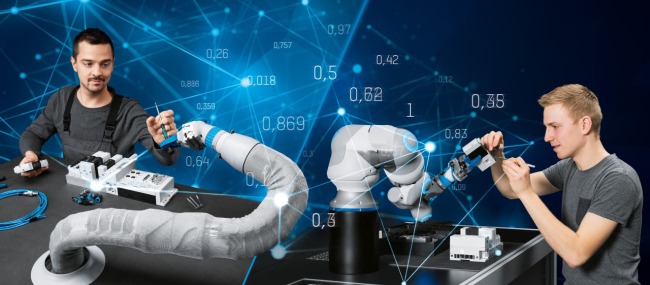
German, Canadian researchers collaborating on AI for picking robots
By DE Staff
Automation Machine BuildingFLAIROP project to investigate ways for picking robots to learn from each other anonymously.

(Photo credit: Festo)
Also known as collaborative learning, the technique allows multiple robots, programmed for different tasks, to build a collective machine learning model but without sharing data. In this way, robot training data from multiple stations, plants and/or companies can be harnessed, but without requiring participants expose company data.
“We are investigating how the most versatile training data possible from multiple locations can be used to develop more robust and efficient solutions using artificial intelligence algorithms than with data from just one robot,” says Jonathan Auberle from the Institute of Material Handling and Logistics (IFL) at KIT.
Called FLAIROP (Federated Learning for Robot Picking), the project will employ four autonomous picking stations, to inform the robot training algorithm: Two at the KIT Institute for Material Handling and Logistics (IFL) and two the Festo headquarters in Esslingen am Neckar, Germany.
Meanwhile, the Canadian project partners – Waterloo, ON-based start-up DarwinAI and the University of Waterloo – will focus on object recognition through deep learning, explainable AI and optimization. The German partners, including KIT researchers, will contribute expertise in robotics, autonomous grasping through deep learning and data security.
“The University of Waterloo is ecstatic to be working with Karlsruhe Institute of Technology and a global industrial automation leader like Festo to bring the next generation of trustworthy artificial intelligence to manufacturing,” says Dr. Alexander Wong, co-director of the vision and image processing research group at University of Waterloo, and chief scientist at DarwinAI. “By harnessing DarwinAI’s Explainable AI (XAI) and Federated Learning, we can enable AI solutions to help support factory workers in their daily production tasks to maximize efficiency, productivity, and safety.
https://darwinai.com
https://uwaterloo.ca/vision-image-processing-lab/
www.festo.com
